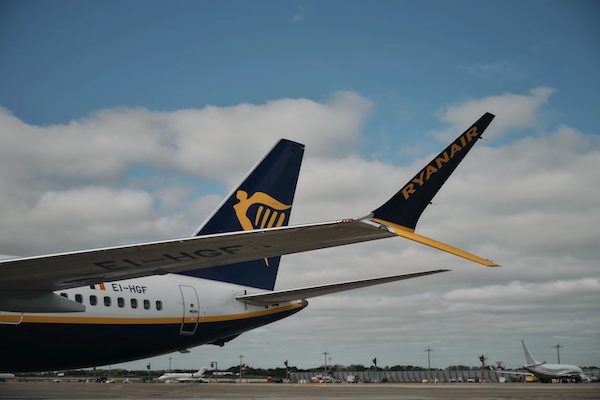Ryanair reported a notable 9% year-on-year increase in passenger numbers during December, showcasing its resilience despite significant operational challenges.
These challenges include the removal of its flights by major online travel agencies and the cancellation of 900 flights due to geopolitical tensions in the Israel-Gaza region.
Ryanair’s Traffic Growth Amid OTA Challenges
Ryanair experienced a 9% increase in December carryings compared to the previous year, despite the removal of its flights by prominent Online Travel Agencies (OTAs) such as Booking.com, Kiwi, and Kayak. These OTAs have stopped listing Ryanair flights following a ruling by the Irish High Court against ‘screenscraping’, which has been a contentious issue for the airline.
The removal of flights from OTA platforms impacted Ryanair’s short-term load factors slightly, expected to drop by 1% or 2%. However, the airline swiftly responded by focusing on its direct sales channels, ensuring it maintained competitive fares for consumers booking via its website. This strategic shift underscores Ryanair’s adaptability in a dynamic market environment.
Impact of Conflict on Operations
In addition to OTA challenges, Ryanair faced operational disruptions due to the ongoing conflict in the Israel-Gaza region, leading to the cancellation of 900 flights. Despite these setbacks, Ryanair preserved its core operations, maintaining a load factor of 91% across its extensive network.
Ryanair’s resilience amidst geopolitical tensions highlights the airline’s strategic planning and operational efficiency. The ability to sustain growth under these conditions demonstrates robust managerial competencies and reflects positively on its overall business strategy.
Retention of Market Share
Furthermore, these competitive strategies are part of Ryanair’s broader effort to retain and expand its market share amidst evolving industry challenges. They support the airline’s position as a leading low-cost carrier in Europe.
Notably, Ryanair’s forward-thinking approach includes partnerships with platforms such as Google Flights, aligning its sales strategy to target tech-savvy customers who prefer transparent pricing without hidden fees.
Comparison with Competitors
While Ryanair faced distribution challenges, rival budget airline Wizz Air reported a more than 18% increase in December carryings compared to the previous year, reaching almost five million passengers. Wizz Air’s growth aligns with a strategic capacity increase of 26%, reflecting the broader market trend of rising demand for low-cost travel options.
In terms of annual performance, Ryanair achieved a remarkable 13% increase in annual carryings, reaching 181.8 million passengers compared to 160.4 million in 2022. In contrast, Wizz Air’s annual carryings surged by 32% to 60.3 million, a testament to its rapidly expanding reach and market presence.
Strategic Partnerships and Market Adaptation
Ryanair’s strategic collaboration with platforms that maintain transparency, such as Google Flights, has been pivotal in its efforts to adapt to changing market conditions. By ensuring that consumers have access to unaltered fare information, Ryanair reinforces its commitment to customer trust and engagement.
These partnerships are essential in a fluctuating market where consumer trust and direct engagement are critical. Ryanair’s ability to adapt by lowering fares and encouraging direct bookings demonstrates its agility in handling external distribution challenges.
Future Outlook and Strategies
Despite the immediate setbacks from OTA removals and conflict-related cancellations, Ryanair remains optimistic about its future growth prospects. The airline emphasises its strategic focus on increasing direct transactions, thereby enhancing its revenue streams and consumer relationships.
Ryanair’s leadership reaffirms that the recent challenges will not materially affect its FY’24 traffic or profit after tax guidance. This outlook signifies Ryanair’s confidence in its strategic business model and adaptability.
Summary of Key Developments
Ryanair’s experience over the past months affirms its status as a resilient entity in the aviation industry. Despite facing significant distribution and operational hurdles, the airline’s strategic adaptability has been central to its continued success.
By prioritising direct consumer engagement and transparent pricing strategies, Ryanair continues to secure its position as a leader in the budget airline sector.
Ryanair’s strategic adaptability and focus on direct consumer engagement have reinforced its market position, despite distribution and operational challenges.
The airline’s ongoing innovations and partnerships with platforms like Google Flights continue to strengthen its brand and competitiveness in the low-cost carrier industry.

